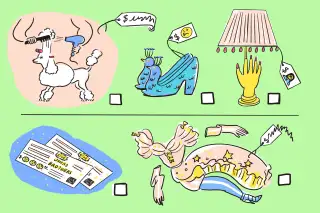Help! I Can't Stop Spending Money on Dumb Stuff

Money recently launched Dollar Scholar, a personal finance newsletter written by a 27-year-old who’s still figuring it out: me.
Every week, I’ll talk to experts about a money question I have, whether that’s “Are online banks sketchy? or “How many credit cards do I need?” As I learn, I’ll share simple ways to improve your financial life… and post some funny memes.
This is (part of) the 15th issue. Check it out below, then subscribe to get future editions of Dollar Scholar every Wednesday.
It was 11:13 a.m. on a Tuesday when I finally got cold feet.
As you're well aware, I've been depleting my bank account daily for the Jonas Brothers this year. My favorite band/obsession since ninth grade, they unexpectedly reunited in February and launched a global comeback tour in August. Because they broke up once before and it's unclear whether they're going to continue playing after this run, I've been on a quest to see as many shows as humanly possible. No matter what it takes.
But when I logged onto Ticketmaster the other day to purchase tickets for their Dec. 13 Jingle Ball concert — the last one I can attend for the foreseeable future — I hesitated. The cheapest seat cost a whopping $232 BEFORE FEES. I love the JoBros more than I love breathing, but that price gave me pause. I couldn't even convince myself to put it in my virtual shopping cart.
Sitting at my desk, I started to have a crisis. I've been spending a lot on dumb stuff lately. Am I normal? How do I know if I've gone too far? How do I fix it?
I contacted Katie Brewer, president of the Texas fee-only financial advisory firm Your Richest Life Planning, to talk me down. Brewer set me at ease instantly by saying fluctuations in spending are "definitely normal."
"I see it generally more with women, but I think guys can do it, too," she says. "Sometimes it's a stress-releasing thing, like ‘I'm going to buy something that makes me feel a little bit better.' Or sometimes it's a soft spot for good deals."
Concert tickets are definitely a make-me-feel-better situation, as are a lot of my purchases. I recently bought the Kindle version of Circe by Madeline Miller to read on my commute. I also got two Opalhouse candles (in the Cedar Pumpkin and Through the Woods scents) for my bedroom just because they were $4.99 and smelled good. ️
But Brewer said that's not out of the ordinary. Even she has a tendency to purchase stuff just because it's on sale — specifically, jewelry from James Avery and Kendra Scott.
Statistically, I fit in with the rest of the country. According to the federal Bureau of Labor Statistics' consumer expenditure survey, the average household's expenditures totaled $61,224 in 2018. The majority went toward housing, transportation and health care.
People also spent an average of $3,226 on entertainment, which was about 4.1% of the average annual income. My candle, book and concert purchases don't exceed that (yet), so my recreational spending isn't really out of the ordinary.
However, it could become dangerous if I get used to self-medicating by spending money, said Cheryl Holland, a financial advisor with Abacus Planning Group in South Carolina. She told me to think about it this way: Drinking a glass of wine to relax after a bad day at work is fine, but getting in the habit of drinking multiple glasses every single day isn't.
Holland said people can usually tell if they're getting into that treacherous territory if friends or family bring it up. Or if they look at their budget and see they're not saving enough or can't afford to pay off their credit cards. A surefire red flag is "if you have a pit in your stomach looking back, [like] ‘I really wish I hadn't done these three things,'" Holland says.
If I find myself in that situation, Brewer said I can try using a separate account or prepaid card for silly, purely fun purchases. American Express has one called Bluebird that has no monthly fees.
"If you can, identify what your weak spot is and have something that limits it," she says.
My dumb purchases are normal, but I should be careful not to let them slide into addiction. If my gut tells me it's not a good decision to spend the cash, I should probably listen.
If I need to get serious about trimming my spending, Brewer said I should look at how much money I spent last month on entertainment and try to only spend 80% of it this month. I should keep to that budget for three months, then re-evaluate and set another goal.
"I don't think that people need to deprive themselves to be able to save what they need or to have a good financial future," she says. "There is a really good, healthy balance between living your life today and being able to save up for short, medium and long-term goals."